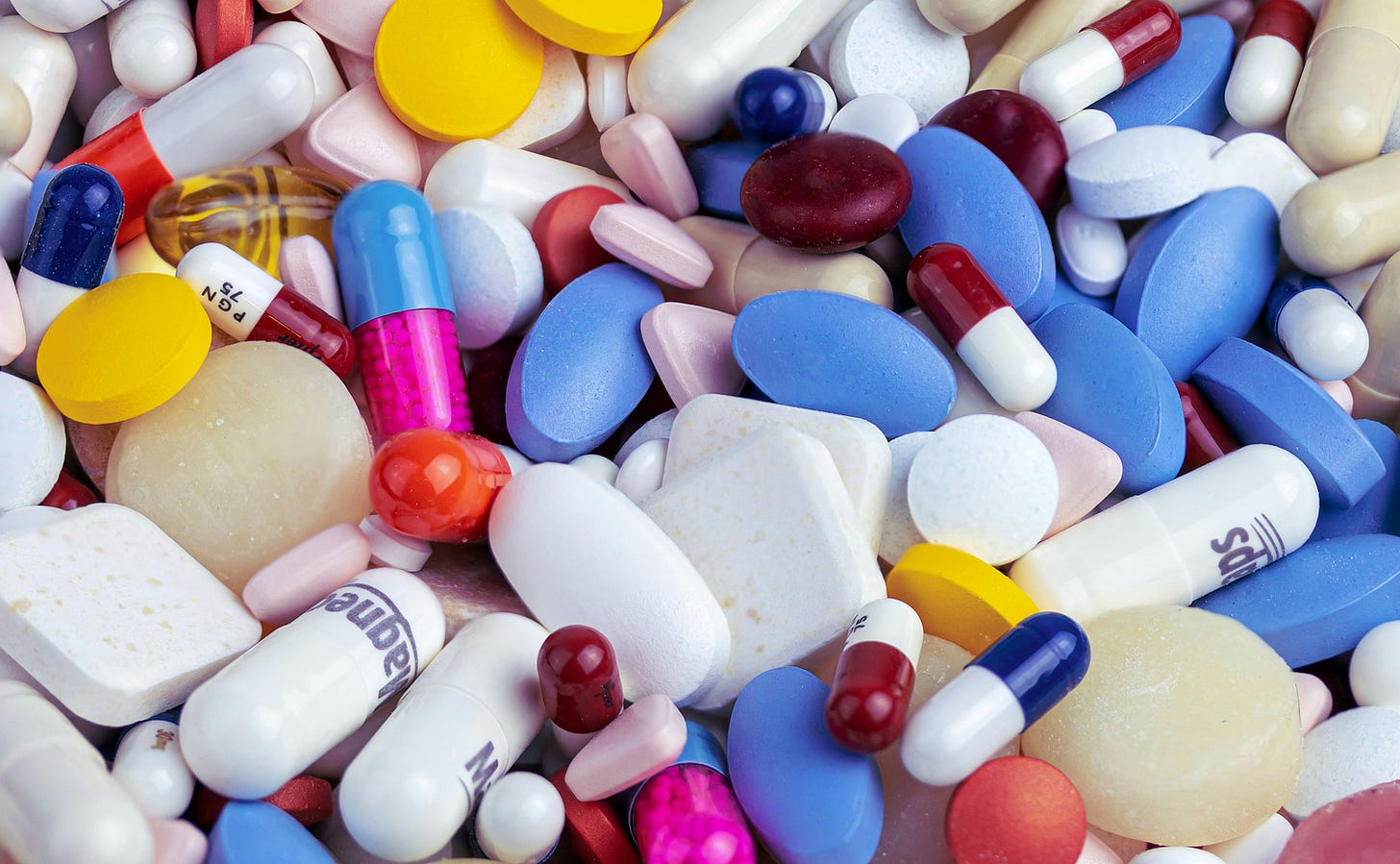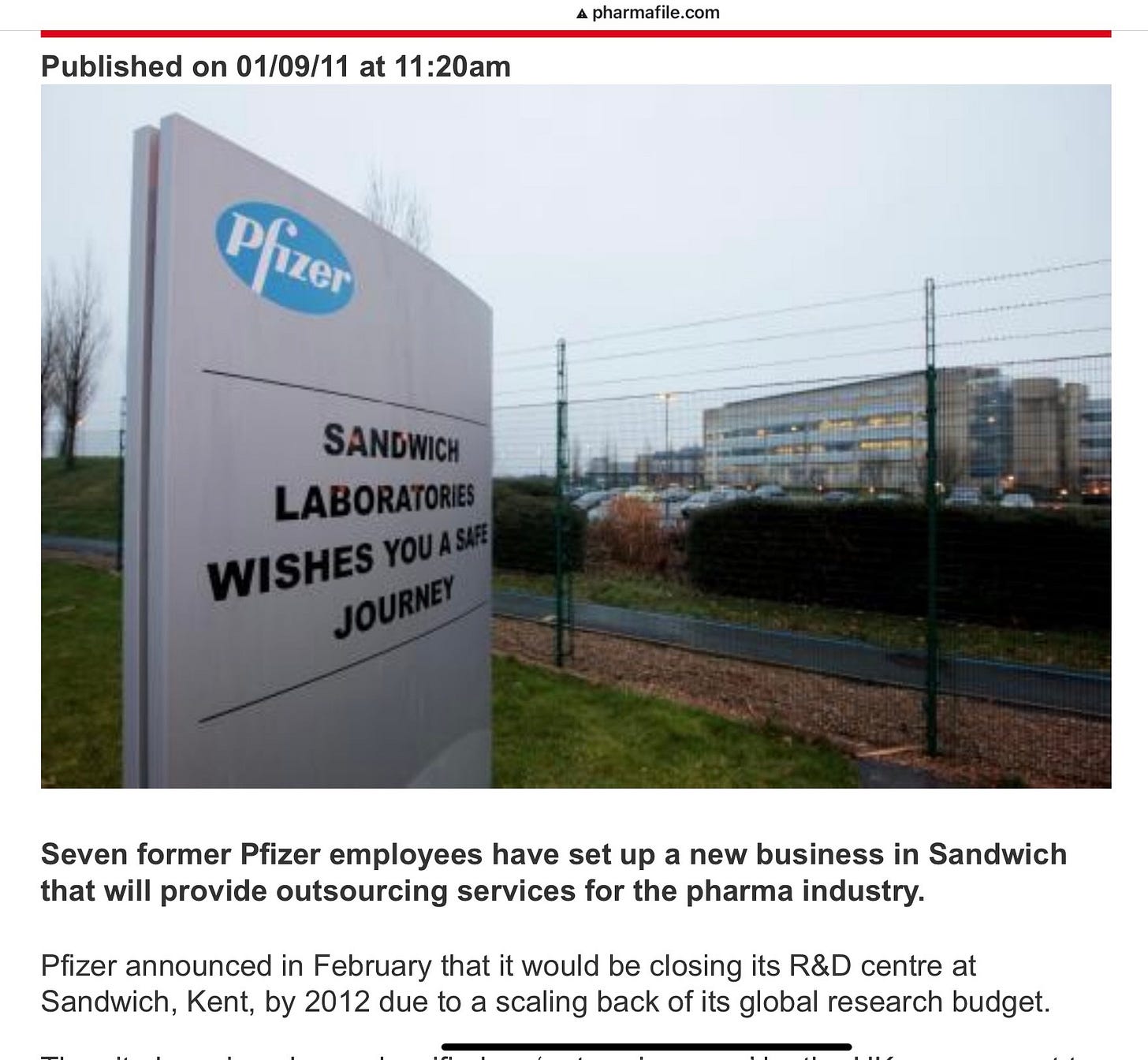Pfizer, Viagra and Ethics
A personal reflection of my time in Kent, living close to the BigPharma giant.
Some people won’t be aware of Pfizer’s history in Kent. Or what one of Pfizer’s most (in)famous medications is, and how it became so ubiquitous.
has written and spoken plenty about his fascinating experiences within senior management at this (and other) Pfizer sites. Here is my ‘ground level’ account for added context.
Pfizer’s “little blue pill” was originally a product of a laboratory in Sandwich, Kent, UK. Sildenafil (a drug that selectively targets and inhibits the enzyme phosphodiesterase type 5 (PDE5)) was developed for the treatment of hypertension (high blood pressure) and angina pectoris (chest pain due to heart disease). But during the Phase III clinical trials of these Pfizer ‘heart disease’ studies, researchers discovered an apparently unexpected side effect: it was more effective at inducing male patient’s penises into erections, than treating their angina.
Pfizer realised the potential benefits of this clinical trial; the unintended consequences of the (in this case, perhaps not-so) ‘adverse’ effect. This unanticipated side-effect could fill a significant gap in the market and (with a bit of PR spin and regulatory manipulation) presented a mega-opportunity for substantial increased profit. So, after a journal article was published in the New England Journal of Medicine in 1998, the US Food & Drug Administration (FDA) approved ‘Viagra’ super fast. Yup, the first oral treatment for erectile dysfunction, under a so-called “priority review” (sound familiar?).
To maximise sales for Viagra, Pfizer used one of the most successful advertising campaigns in history (until now, that is). Celebrities were enrolled. A team of well-paid commission-based sales reps (not medical professionals) were quickly trained and recruited to personally promote Viagra at every available GP surgery and clinic. The strong incentives ensured the phrase “erectile dysfunction” (ED) became the newly-adopted term in every clinicians lexicon.
Those who have seen the Netflix series ‘Painkiller’ about the opioid crisis (or similar docuseries) will recognise what I’m describing. These marketing campaigns have been well-honed over the decades.
Who would have imagined that Pfizer’s PR role would later be taken on by our Governments?

Viagra was once one of Pfizer’s blockbuster drugs, generating over US$1bn in sales every year for 17 years and reaching a peak of $2.1bn in 2012. Although the stigma associated with ED was reduced, psychologists warned that Viagra became a lifestyle drug that encouraged people to neglect underlying health problems that cause impotence. (Again, sound familiar?) But prescribing millions of those little blue pills seemed to be the easiest option for many. And Pfizer would repay supportive GPs with generous incentives.
So, in 1997, Pfizer announced an investment of £109m (approx NZ$305m ) in a flash new research facility at the South East England site at Sandwich, creating 1,000+ new jobs. The large high-rise, modern glass-fronted building was just out of town, but close enough to be a blot on the architectural landscape compared to the quaint mediaeval market ‘cinque port’ of Sandwich:
I lived near Sandwich during this era. Many of the local businesses understandably depended heavily on this new Pfizer money - their staff were regularly eating out on generous expense accounts at local restaurants, champagne flowed as they bought cars and rented the large antique-filled houses - it was a love/hate relationship.
It was LOVE because many of these staff were highly educated, very well-paid international professionals: they worked long hours and liked to flaunt their wealth: we were told we should be ‘honoured’ to have the benefit of their investment in and around our small community.
HATE because those corporate buildings cast a sinister shadow of mystery and shame over Sandwich. Increasingly, suspicious animal welfare activists wanted to know exactly what went on behind those barbed-wire electric fences. And sure enough, the subsequent inevitable photographic evidence (remember this was before any social media) was shocking. Skips carrying warning signs of ‘hazardous waste’ contained hundreds of dead beagle dogs who had endured god-knows-what experimental horrors from within those building’s chemistry labs. As RFK Jnr described in his book The Real Anthony Fauci, those innocent animals lives were seen as ‘collateral damage’ in BigPharma’s never-ending pursuit of the next profitable ‘medicine’ (or vaccine).
But the success of Viagra was not everlasting - every patent has an end date. Laboratories worldwide are always keen to tap into any profit by copying any medicine, and Viagra was a massive market to capitalise on. So eventually the Pfizer laboratories were consolidated to cut back on overheads. Some buildings were leased. And in 2011 the Sandwich site was closed completely and the buildings sold to later become a retail centre for various different companies.
Further consolidation continued over the next few years. MSM reported in 2019 how Pfizer share price had been ‘flaccid’ since losing the patent on their best-selling drug.
How convenient that within months Pfizer found a new market to plug?
Who would have thought 10 years after the closure, a new ‘Pfizer’ (even if in name only) intervention would be undergoing a different type of clinical trial - this time a new ‘vaccine’ and a medical genetic experiment on a global scale.
I see now there was symbolism in the juxtaposition of those flashy, fast cars driven on narrow, cobbled streets by those Pfizer employees. The unethical, corporate greed contrasts with the philosophical reflections of the mediaeval and enlightenment period. Many of us are returning to those spiritual questions about the existence of God, the importance of happiness and the power of nature.
Those flashy, fast cars are long gone. The ancient homes and churches in Sandwich, remain solid.
In conclusion, the scale of Pfizer profits reached unimaginable new heights over the covid era. But what will the unintended consequences and the ‘collateral damage’ of this horror story be? What will happen to the name ‘Pfizer’ five, ten years from now? And more importantly, how can we raise awareness now, about the corruption of BigPharma and stop this unethical exploitation from repeating itself once more?
NB This is an updated and revised version of a blogpost by me from 2021 on a site that is now deleted.







Have you encountered any censorship yet as other user of substack have in recent days? In fact there seems to be a lot more happening even with rumble etc.
But over the last four years, the vast majority of animal rights' activists have forgotten their previous opposition, not just to Pfizer, but the pharmaceutical industry in general. Because of the 'pandemic' (and more supposedly to follow), they've developed a blindspot. As the Vegan Society's (then) dietitian told me by e-mail three years ago, 'there is no alternative' to taking the COVID19 vaccine, (after I had contacted her with regard to the Vegan Society taking a pro-active stance on healthy nutritional issues).